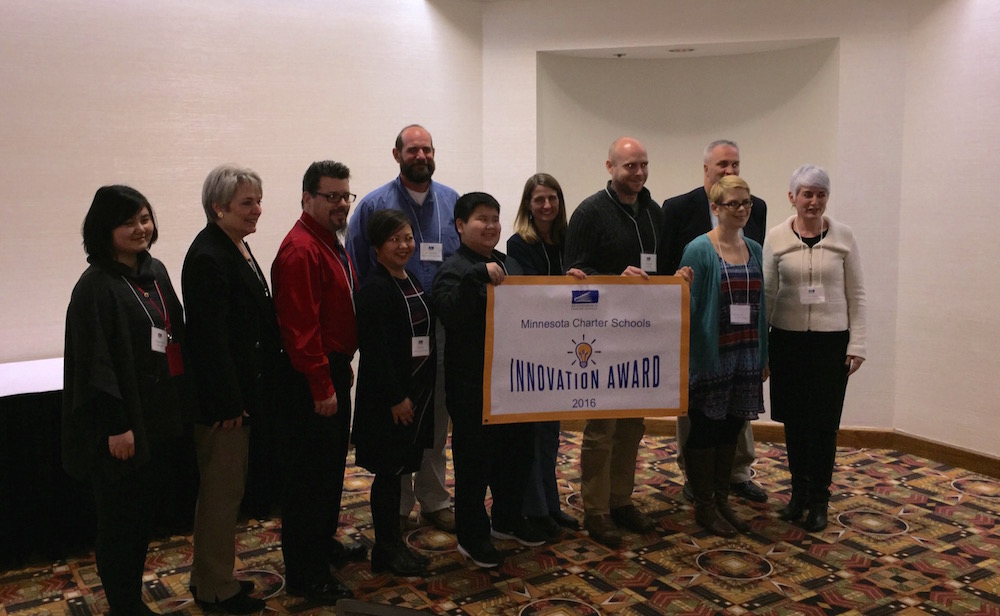On December 6th, the Minnesota Association of Charter Schools (MACS) hosted a luncheon in St. Paul to honor the winners of the first Minnesota Charter School Innovation Awards. The award program, which is the first of its kind in Minnesota, was created to showcase some of the most innovative practices being used in Minnesota’s charter schools and to also focus attention on the important role innovation should be playing in the development of charter schools, according to MACS executive director Eugene Piccolo.

Before the winners were recognized, Ted Kolderie, Co-Founder and Senior Fellow at Education Evolving as well as an instrumental contributor to the 1991 Minnesota charter legislation, made some remarks about the original intent of chartering. Kolderie reminded the audience that chartering was meant to be a space where schools could be “minimally constrained” and would be “free to try things”.
He went on to explain that, while chartering takes up a relatively small space in public education, it continues to make an important contribution by generating new models of learning and of governance that spread to other charter and district schools.
The five Innovation Award categories come from the purposes that are defined in Minnesota charter law (124E.01):
- Increased learning opportunities for all pupils
- Different and innovative teaching methods
- Different and innovative forms of measuring outcomes
- New forms of accountability for schools
- New professional opportunities for teachers
Increased Learning Opportunities for All Pupils
The Community School of Excellence (CSE), a K-8 charter school in St. Paul, was recognized for their Asian Penguin Club. The Club started 5 years ago when Stu Keroff, CSE Technology Coordinator, received computers for his classroom from a nonprofit that had installed Linux, instead of Windows, on them. According to Keroff, he and the students, “started a club for kids to learn about Linux and open source software, and have fun doing it. We had no absolutely no idea that something big was happening.”
The Club, now comprised of over 40 students in grades 6-8, installs Linux operating systems on computers for other students at CSE, and they also program recycled computers that they donate to families in their community. The students also teach the families how to use the computers in their native language, to help close the “digital divide”. To date, the Club has given away over 80 computers.
Different and Innovative Teaching Methods
The Community of Peace Academy (CPA) High School, located in East St. Paul, was recognized for their “College Culture” program. CPA is a local leader in concurrent enrollment and college readiness, with robust College in the Schools (CIS) and Postsecondary Enrollment Options (PSEO) programs. They also have partnerships with College Possible and the TRiO Educational Talent Search. During the 2014-15 academic year, 83 CPA students earned 460 University of Minnesota credits through CIS, which saved them over $213,000 in college tuition.
Different and Innovative Forms of Measuring Outcomes
Avalon School, a 6-12 teacher-powered charter school in West St. Paul, was recognized for their implementation of project-based learning (PBL), which has replaced conventional classroom models and forms of assessment. PBL gives Avalon students the opportunity to demonstrate subject mastery through projects that they work on in small group advisories.
The smaller projects that the students work on throughout their time at Avalon build to their Senior Project, which is an intensive, year-long project that ends with a public, 30-minute presentation—during which they must demonstrate the outcomes of their learning. According to the Avalon website, “Many seniors use the senior project as a springboard to develop interests and skills they will go on to study at a post-secondary level.”
Avalon was also recognized for their “teacher-empowered” model. Teachers have implemented 360-degree evaluations that are completed by each teacher’s colleagues, advisees, and the families of their advisees. The evaluations enable teachers to quickly adapt their teaching to meet the individual needs of the students. Carrie Bakken, one of Avalon’s founders, asserted, “When you put teachers in charge of learning, they make assessments that are relevant.”
New Forms of Accountability for Schools
Yinghua Academy, a K-8 Chinese immersion charter school in Northeast Minneapolis, was recognized for their partnership with the Minnesota Online High School (MNOHS). Yinghua was worried that their students’ Chinese skills would regress if they did not have an opportunity to further hone and develop their Chinese when they move on to high school after 8th grade. To rectify this problem and hold themselves accountable for the continued learning of their students, in 2014, Yinghua partnered with MNOHS to create free online Chinese courses for public school students who may not have access to high-level courses at their high schools. Through this partnership, MNOHS and Yinghua have developed year-long learning courses for Advanced Chinese 1, 2, and 3, which prepares students for the AP Exam and allows them to continue their Chinese language education.
New Professional Opportunities for Teachers
Minnesota New Country School (MNCS), a K-12 charter school in Henderson, was recognized for their teacher-powered model. All decisions traditionally in the realm of administrators (hiring, budget, school calendar, etc) are made entirely by the teachers. In addition, distributing administrative roles among the teachers frees up additional funding for more staff who interact directly with students.
Award Benefits and Second Annual Award Cycle
Each winning school, in addition to being featured on MACS’ website and in a press release that they will distribute, received an unrestricted $1,000 award. The schools will also be featured in an organized “Innovation Showcase Tour”.
The second annual Innovation Award application will open on Monday, December 12, 2016 and close on Friday, February 3, 2017. Year two winners will be featured at MACS’ conference during National Charter Schools Week in May 2017; awards will be presented each spring going forward.
Found this useful? Sign up to receive Education Evolving blog posts by email.